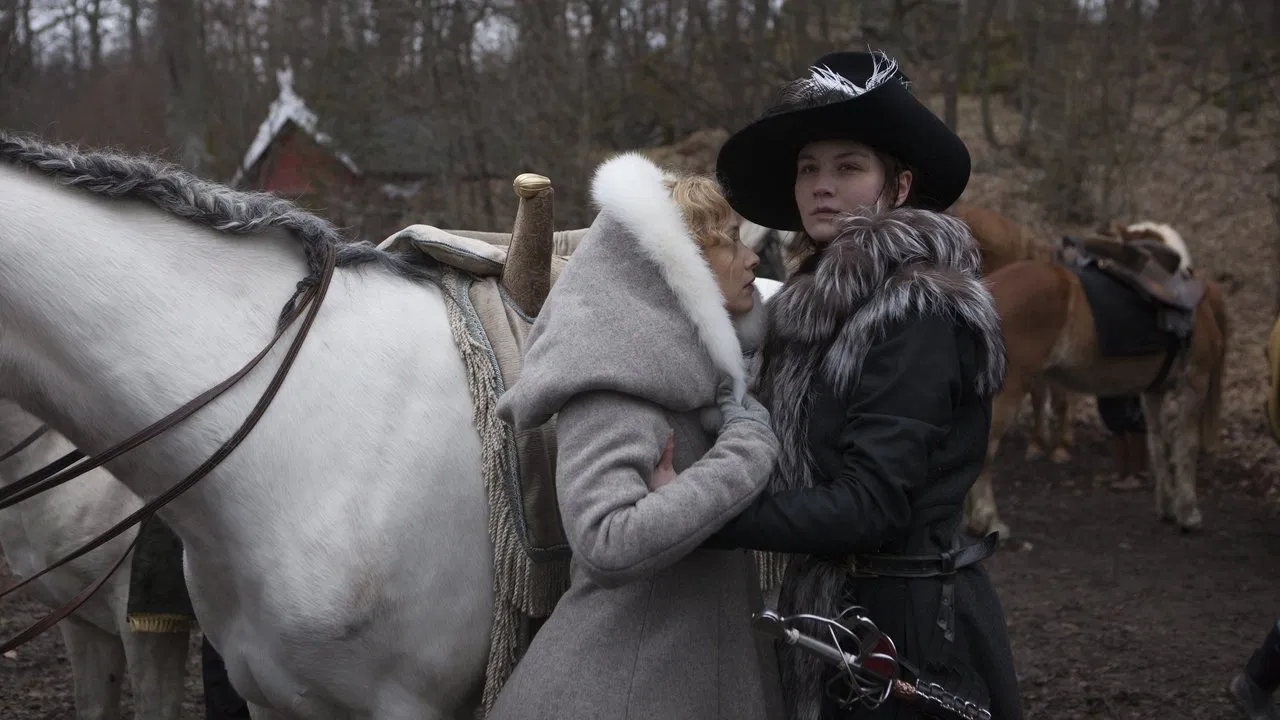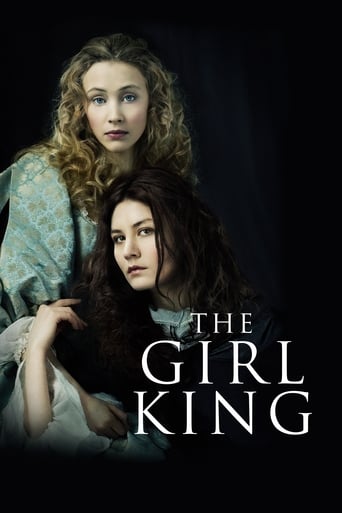

One of the best films i have seen
... View MoreAt first rather annoying in its heavy emphasis on reenactments, this movie ultimately proves fascinating, simply because the complicated, highly dramatic tale it tells still almost defies belief.
... View MoreIt's the kind of movie you'll want to see a second time with someone who hasn't seen it yet, to remember what it was like to watch it for the first time.
... View MoreThis is a small, humorous movie in some ways, but it has a huge heart. What a nice experience.
... View MoreMika Kaurismaki's Queen Christina of Sweden (Malin Buska) is tall, beautiful, and without a hump on one shoulder, but otherwise she's a fair representation of the historic figure. In her restless spirit, intellectual appetite, impatience with the patriarchy and her lesbianism she's a much more accurate representation than Rouben Mamoulian's (Garbo in Queen Christina, 1933). Of course Kaurismaki opts to revive the 17th Century Christina story now because it's a sharp reflection of our times. I don't know how Swedes or Finns will see their lives in this film, but much of it rings clear for North America and Europe today. The film bristles with pertinence, like the male advisor's "Peace doesn't fill our coffers" and her "Austerity is sadistic."Christina's advocacy of peace, culture, the arts, make her a model for modern leadership. In her refusal to accept male authority, especially not to allow any man to claim her as a field he can plow for his pleasure, she is the prototypal feminist. Sadly, the contemporary also limns through her ultimate defeat by the male authority and their rejection of her same-sex passion as "deviance." Her male counsellors conspire against her, drive off her beloved, and drive Christina into madness, until she escapes. We're still hung up on the questions she poses to Descartes: what is love, how do we deal with it, how can we free ourselves from it. We still crave the freedom to define our own destiny and escape our inherited structures and strictures. If we've moved beyond Descartes' assumption that our emotions have a physical source, we continue to build upon his confidence in empirical evidence and in the essential use of reason. But another Cartesian statement propels the film: To find the truth we must abandon everything we have learned or assumed and establish a new understanding of our world. This is the triumph of discovery over habit, reason over delusion, freedom over "destiny." This is how this Christina constantly flies in the face of what she has been taught and what is expected of her. Her escape is ironic. Her advisors having long insisted she marry to produce a clear heir to the throne, she now proclaims one suitor her son and bestows upon him her royal authority. With a quarter of the treasury she departs to Rome, where she converts to Catholicism and enjoys the life of secular culture and stimulation she has craved. As one counsellor bitterly observes, having rejected all her male suitors she settles into life under the authority of the Pope. The last shots, however, play her as exulting in openness, freedom and the light the Swedish court and "thinkers" denied her. She abandons her throne and power to recreate herself in Rome. Now, here's the crowning irony. Mika and younger brother Aki Kaurismaki are famous for acerbic contemporary stories about inarticulate, hard drinking, ugly and lugubrious losers, steeped in 1950s rock and roll. Nobody in a blind test would guess The Girl King is a Kaurismaki film. But here the director does what his heroine does and what her healthiest mentor, Descartes, prescribed. To find the truth, to see how Queen Christina reflects upon our current reality, Kaurismaki discarded his customary period, his familiar genres and his signature style, then and bathos — to make something completely new. And true to our day as it is to his subject's.
... View MoreThe super-interesting trailer for The Girl Kind promised more than was really in the movie. It's kind of an open and unfinished story on multiple levels - Kristina's reign regarding the military campaign, country reforms and her personal life. All these important stories were merely touched in the movie. We never got to see whether or not Kristina actually reformed anything in Sweden at the time, the military campaign was also very vague and her relationship with the Countess deserved much more.I indeed expected more to be seen between the two ladies in terms of chemistry and storyline. Though they shared enough time on screen, the relationship is missing a lot. We could only get a glimpse of Buska and Gadon's potential in a few scenes where they showed subtle, unspoken affection between the two characters. It's a pity the director did not use more of their talent to tell a very personal story of Kristina and how deep the relationship with Sparre must have been. There is enough historical evidence to confirm Kristina's sexuality. A character so passionate about knowledge, philosophy and art surely must have been even more passionate about the affairs of the heart. It's a pity only the dark side of it was depicted in the movie. In spite of this movie being about Kristina, obviously a lot of her is embedded in Sparre's character. Unfortunately, Sparre's side of the love coin was left unexplored.
... View MoreI wouldn't consider this the best movie I've ever seen but it was quite interesting about Queen Christina and her lesbian affair with Ebba Sparre, her lady-in-waiting. I suppose, it was rather interesting to go deep into her short term as a leader of Sweden. I never even heard of her before until today, I saw this movie. I reckon if you live in Sweden, you would know who Queen Christina is. I have to say Malin Buska is a good Swedish actress in this, she reminds me of Kirsten Dunst with her beauty. I liked in the film that herself and Sarah Gadon relationship were in a dangerous love together. It does make the film feel powerful and so Victorian! Although I didn't like in this film that the scenes dragged on and this film is nearly 2 hours, it should've been an hour and 16 minutes. It would do rightly and earn 10 stars. If you like watching Victorian then you'll like this!
... View MoreI caught this film entirely by accident, with zero expectations or knowledge of the subject matter. I am unqualified to speak to the historicity of the events. But if it is close to historical events, what a beautiful film was made of it. Dealing with politics and religion and feminism, it is a rare little gem. Christina, the Queen (actually "King") of Sweden from 1632 (age 6) until 1654, was tutored by a unique man, and grew up to be a young woman with curiosity about the world and a taste for life, she shook the institutions of the day, with an unkind mixture of success and failures. The film is mostly in English with a little French (accompanied by subtitles), the actors do a fine job, and I really appreciated the makeup team's subtle approach. I might have appreciated a script less focused on romance and more on personality and accomplishments, but then again, in our 20s, hormones can dominate all.
... View More